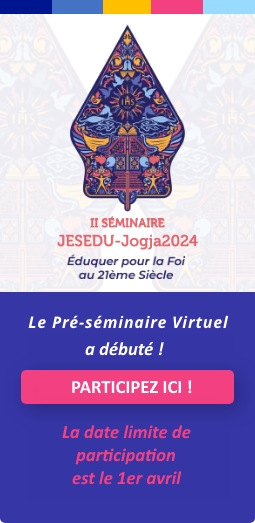In this article we are delighted to share an interview with Maggy Ntana, teacher at Collège Alfajiri school in Democratic Republic of the Congo, who participated in the Ignatian Global Citizenship facilitator-led global course. This facilitator-led global course is a new synchronous global learning experience for Ignatian educators. A new course modality that gives members of our global community the opportunity to learn together as a global group of learners coming from other schools and countries around the world.
We would like to thank Maggy for sharing her learning experience with other members of our global community through this interview. Thank you Maggy!
Q1. Which of the topics covered in this course most interested you during this group learning experience? And why.
I was most interested by “Interconnection Beyond Borders”.
Why did “Interconnection Beyond Borders” catch my attention?
Interconnection itself means “to connect with one another, to be or to become mutually connected”. It also means “to be related to each other”.
I understood this topic with the example of two economically interconnected countries. Two economically interconnected countries develop a global network of trade, communication, immigration and transportation. All these are facilitating means for a good exchange of resources, which leads to economic growth in both sides.
In the case of Jesuit schools, interconnection is already initiated. Initiated because the means is already create, the roads to bring goods from a county to another, from a college to another are already built. This means is “Educate Magis”. It is now up to us, teachers of Jesuit colleges to develop our schools by profitably using Educate Magis, a well elaborated tool to help educators around the world exchange their knowledges. It helps us bring from our county to another and take from different countries to ours; from college to college.
Interconnection in our schools allows us see the way other colleges handle the different problems we may have faced before or see how they resolved what you have just faced; this is learning from each other. It will help us take new strategies to prevent problems or even compound them and find solution together as one body.
We can also learn new teaching methods and procedures from other teachers around the world and improve our performance.
Interconnection Beyond Borders means for us finding out how we can best come together to find the solution that we need, to promote each other, to help each other and secure sustainable and inclusive growth worldwide.
Q2. Did you feel you gained a richer or deeper understanding of this topic by reflecting on and discussing it with a global group? If so, please explain.
Reflecting on this topic and discussing it with a global group gave me a deep understanding of it. All the confusions I had on Global Citizenship are now gone. I now know that “Global Citizenship” does not mean powerful countries control poor ones but that it means behaving like citizens of the world, feeling concerned by all success and failure around the world, understanding that our common home must be taken care of at all levels because it belongs to all inhabitants of it, but also that all human beings around the world have the same rights.
Q3. Was this your first time taking a course related to “Ignatian Global Citizenship” as a global group? Please explain your experience.
Yes, this was my very first time to take a course related to “Ignatian Global Citizenship” and I learned a lot from it. I felt all my prejudices on “Global Citizenship” gone. I learned from others’ experiences about how to take care of our common home, how to fight poverty, and how to enjoy one’s rights as human. Good examples of what others do in their own schools to take care of the common home, to fight poverty and what they do to bring all their pupils be aware of their rights were given and this was very interesting to be applied! From all the strategies explained I understood that everything depends on human work. People’s work has a great impact on the world; human work is what matters and the transformation of our common home should go beyond theory. Something must be done for the effectivity of important topics like ecology, human rights, and the fight of poverty…
Q4. What other takeaways would you like to share with other educators who might be thinking of taking this course?
To other educators who might be thinking of taking this course, I advise you to take it as soon as you have this opportunity! It is a wise decision taking the course and you are really encouraged to do so. What we still need to know is bigger than what is already in our minds; we are perpetual learners! Always join others when they gather for a discussion to broaden your knowledges. Global citizenship is one of the topics our pupils need to know about nowadays. There is no way teaching something we don’t know ourselves. Let’s learn in order to be able to teach our pupils.
Se connecter ou Adhérer
pour créer et afficher des commentaires
